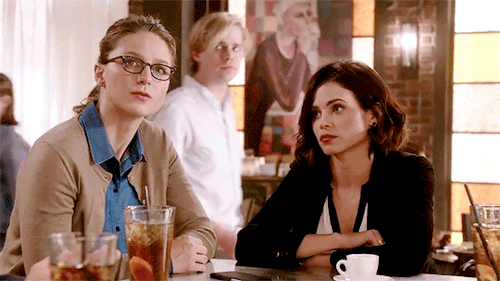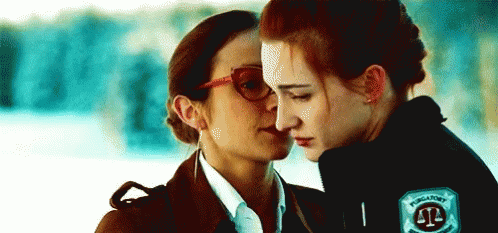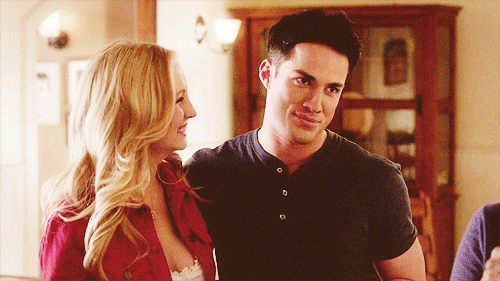A piece of fiction might call our attention because of its original concept with intricate world-building, a great premise, or even just an actor or writer whose work we have enjoyed before. That is all well and good to watch the first few episodes. For many it might be enough to continue watching and being engaged. But for me, it will never be enough to keep me there. It is the characters, and their relationships, that hook me. They are the point of no return.
Try as I might to be a very professional would-be screenwriter, and watch something solely for its quality, I find I cannot be one-hundred per-cent there unless I am interested in the people portrayed: whether they live or die, and the affectionate relationships they build or destroy among them. This includes friendships and familial bonds, but it also includes romantic relationships. And I mean shipping.
When I’m hooked on that, I am one-thousand per-cent there.
It’s not that I watch everything solely for the ships. In fact, when the ships take over the entire plot, I tend to agree with Gretchen in that it turns me off. I’m perfectly capable of watching a show without ships I like. In my most recent delve into a show with Agents of S.H.I.E.L.D. (AoS), I got hooked on Skye/Daisy’s craving for familial connection, which she tries to find literally everywhere she goes. I was particularly hooked on the dynamic between her and Coulson–her unequivocal father figure–and sometimes even May–the stern, stoic mom figure.
I’m very “meh” about most of the ships on AoS. What I’m saying is, when I there is a ship I feel strongly about on a show, I’ll watch even when there’s nothing left in it but that. Which is horrible! It’s a curse.
Shipping can be like a drug, and when you’re hooked, you can’t wait to get your fix. Even if it is a truly inconsequential interaction between two characters, especially ones that haven’t come to fruition in the canon of the story. If you’re addicted, you will play this a billion times and see something more every time.

And like any drug, each fan picks their poison, or falls prey to their biggest weakness. There are many things to choose from and to mix and match–wlw culture, for example, loves their Tol and Smol and their Blonde and Brunette. In a combo, when possible (See GIF above). But I’m here today to talk about one of my Kryptonites, something I like to call…
Brood and the Sunshine
You know them.
One is sad and melancholy, possibly grumpy and dry, or maybe even serious and sullen. The other is positive, maybe cheery and possibly even perky. Sunshine is not always happy, they’re positive even in the face of adversity. Brood is not a cruel person*, they’re just mulling too much over the bad things in their lives to see the positive.
Their absolute polarity allows them to balance each other out, and when they’re without each other, their extreme charges can tip the scale.

In the same way, their differences can lead to conflict that is hard to navigate. They’re opposites, and it can be hard for one or both of them to meet in the middle. This brings angst into any Brood and the Sunshine relationship, and I am also a sucker for angst, big time.
The combo can also work for partnerships and strong friendships, as well as friendships that are embraced by fandoms as non-canon ships. There are variants and nuances to it, and I’ve gathered some of my favorite examples, some recent, some that were over a while ago and I like to revisit.
*This is crucial for my enjoyment of this ship. They can be pissy and snappy, but not bad people. I despise the “I’m a terrible, murderous a**hole to everyone but you, because you’re special”. Ugh. No. I’d rather watch dogs pooping on a loop.
Tortured Past/Relentless Optimism
Someone with a past so horrible that they have given up on themselves and the world meets someone so good and untainted by evil, that Tortured cannot help but recover some of that hope. Optimism makes them see a light at the end of the road.
Through interacting with Optimism, Tortured is able to see that perhaps this world is not lost after all, that there is something in it worth protecting. On her own part, they help Optimism lose their black and white lenses, and realize that the world is not as simple as they imagined. That there is beauty in destruction, perhaps.
My favorite example of this brand of Brood and the Sunshine Laura and Carmilla, from Carmilla. (SPOILERS AHEAD)

These girls did all of the above for each other and more, but it was truly a bumpy road. Jordan Hall managed an incredible feat in writing the relationship between the three-hundred-year-old vampire and nineteen-year-old Laura Hollis. It is a relationship that could have gone south and into unfortunate territory, but Hall didn’t back away from the hardships.
The tipping point comes in Season Two, when Carmilla accuses Laura of loving the idea of what she could become (a hero) as opposed to who she is. Carmilla in turn realizes there is something about herself she must change to feel good about herself for the first time in centuries. This can’t be fixed by simply glossing over the problem. Carmilla can’t easily get over Laura suspecting and then blaming her. Three centuries of passive compliance with evil are hard to ignore for Laura.
Their ultimate coming together feels organic and comes from their voluntary internal changes. Neither gets woobified or idealized, in the end. No one does Tortured Past/Relentless Optimism better.
Damaged Goods
Both of these people are damaged. They’ve done something terrible or had something terrible happening to them. In both cases, the damage seems irreparable. One of them chooses to smile and face the new day, the other chooses to give up.
One of the only ships I have cared about in the five seasons of AoS is a pair of Damaged Goods. (SPOILERS AHEAD)
Phil Coulson died and was revived against his will, left with the torture of memories lost and everyone in his personal life thinking him gone. Melinda May made a choice to kill someone and it has haunted her ever since, ruining her marriage and driving her out of the field.

May brings Coulson back to reality when he goes too much in his head. Coulson makes her smile. Nay, he makes her remember she’s capable of smiling. Even when she’s trying really hard to keep her stoic walls up, he gets through. They both see in each other what the other can’t appreciate about themselves. They’re not ruined, they still have a lot to give. Added to that, I love to see a ship involving people older than forty treated with the same delicacy and respect as the younger characters’.
It is also a long, slow burn. I love me a slow burn.
Suffering Empath and Bubbly
If you don’t know what a Suffering Empath is, read this article. They suffer in silence and yet are completely attuned to the feelings of everyone around them. Paired with a Bubbly character, they see their constant thoughtfulness contrasted with them and absorb some of Bubbly’s joy. Empath however, can help Bubbly tap into their feelings, help them realize they don’t have to act like this all the time for the benefit of others.
Wynonna Earp’s Nicole Haught and Waverly Earp fit into these descriptions. Waverly’s joy and optimism is contagious, and brightens Nicole’s everything. But Nicole can also see through that winning attitude into Waverly’s darker thoughts, and gives Waves a space to be “not okay” around her. Nicole’s bubbled up discomfort and pain must eventually come to a head, and that also helps pop Waverly’s Bubble and stop idealizing Nicole.

The writing on Wynonna Earp has also allowed them to be flawed and stubborn in their own way, when it could have been too easy to have a smooth sailing relationship for them. But even when we think we want that, conflict makes everything better.
Pure Brood and the Sunshine
Back in the day, I used to watch The Vampire Diaries. The show caught me in its net of well thought out vampire lore (one of my favorite vampire lores ever). But it didn’t hook me, truly hook me, until Caroline and Tyler. (SPOILERS AHEAD)
These two also fall into the Damaged Goods category. Katherine (best villain tbh) murders an out-of-the-loop Caroline, turning her into a vampire. Tyler is tricked into triggering his werewolf curse. They’re not just damaged, they’re monsters.
But Caroline is still the Sunshine, and she’s determined to make the best of it no matter what. Becoming a vampire even helps her become a better person, though she still has a hard time appreciating herself (which is why she goes after a guy who is terrible to her and for her). She’s perky and has a “what’s next” kind of attitude to hardship. Tyler is still the brood, the “no one gets it” jock who needs a serious reality check before they can get together.
This Brood and the Sunshine pair got one of the best Bad Boy Not!Woobie twists I have ever seen. After Caroline helped him hide his secret, Tyler betrays her out of true confusion and fear, but Caroline refuses to woobify him. She basically tells him he doesn’t get to feel sorry for himself for hurting her, he better get his act together, and then they’ll talk. Watch the scene here. She helps him see how he needs to change, but she won’t suffer him while she coaxes him into it.
A well-developed Brood and the Sunshine relationship that shone bright for two seasons before going awry, but that stills makes me sigh when I remember it.

Bonus: Pure Brood and the Sunshine, Non-Canon
Writers might think they want to do Brood and the Sunshine as a friendship. And it might even work, in some cases. But no matter how hard you try, if you put a brood and a sunshine together on screen, people will ship it.
There’s no proof better than Kara and Lena in Supergirl. Writers and actors alike have gone on record time and time again clarifying these two are completely platonic. But they’re a Brood and a Sunshine! Their personalities are complimentary. The energy they pass of to each other will inevitably lead to chemistry (especially if the actors also have it naturally on-screen). And you can give them other relationships and pull them apart on the show, but a brood and a sunshine are like magnets, and the audience will see that, and react accordingly.

Kara believed in Lena before anyone else did and defended her to her friends and family. Lena finds inspiration in Kara/Supergirl to keep pushing against the current and make an effort to be a good person. Even when they have conflict, their Brood and Sunshine personalities come into play: Kara’s black and white worldview and Lena’s resentment over her past coming to the surface.
These two will likely never be canon, but they have been, for two years, one of the most shipped ships in the TV Universe, ain’t nothing anyone can do about it.
In Conclusion
I can’t escape shipping. When it comes for me, it jumps out of the shadows of a show I’m watching and doesn’t let me go. And while I thoroughly enjoy a show where I don’t ship anyone (Mad Men, for example) I can’t deny there is an added bonus when there is a shippable ship. Especially a ship as shippable as Brood and the Sunshine. I’m only human!

